"The desert town of 'Camel Festival'"
Bikaner Tourism
Located in the midst of Thar Desert, Bikaner is a "cultural paradise and a traveller's haven". The city will mesmerize you with the camels sauntering its beautiful sand dunes and captivate you with its ancient palaces and forts. Rightly called as one of the three great desert kingdoms of Rajasthan, the dazzling city boasts of old-world charm, opulent havelis and depicts a pleasing bygone era of the Rajputs. Best known as the "camel country" for breeding some best-knownn riding camels, Bikaner also happens to house one of the only two models of the biplane used by the British in World War 1.
Bikaner with its magnificence in architecture, art and culture has sands filled with colour, festivity and cultural marvels. Sand Dunes and the Desert Safari are among major attractions. Bikaner is also famous for hosting the internationalCamel festivalwhich draws tourists from world over. Other attractions here include experiencing delicacies such as Thandai, Bhujias, shopping for the fascinating Ivory and Lacquer items or simply witnessing the immense heritage taking the form of wall paintings and arts and crafts in the area.
Download Bikaner PDF Guide >
What's Great?
Rich in culture with many heritage properties, Havelis, hotels and forts. The traditional architecture takes you back in history. Less populated. Lip-smacking Rajasthani delicacies and snacks including the famous Bikaneri Bhujia.
What's not so Great?
Extreme weather conditions, especially in the summer season and frequent rainstorms with dusty air. Not so developed town and there are very few luxurious shopping centres and restaurants.
For Whom
Great for the people who want to know the gist of Rajasthan. Perfect for history buffs and those who like exploring and digging into the past. Very good for dessert lovers as Bikaner is famous for its sweets.
History of Bikaner
Bikaner was a barren land, ruled by the Rajputs in the 15th century and was known as ?Jangladesh?. In 1488, Rao Bika established the namesake city and built the famous Junagarh Fort. Rightly considered as the oasis in between the Thar Desert, the city was a strategic point of trade between Gujarat and Central Asia. Major construction and development in Bikaner happened under the rule of Raja Rai Singh who ruled from 1571 AD to 1611 AD as he won many wars and accolades and also conquered the Mewar Kingdom and got rewarded for the same. In the 18th century, however, the kingdom fell into the hands of the British Empire, although the Royal family kept ruling the city. Eventually, the family shifted to the Lalgarh Palace where it still resides to date.
Culture of Bikaner
The dynamic and vibrant culture of Bikaner gives you a peek into the tradition, practices and people of the city. People are fond of their culture and they (especially men) dress in traditional dress of Rajasthan- ghaghra choli for women and dhoti kurta for men. Most men are seen donning a pagdi even on usual days.
Hinduism is the major religion followed by the people and Rajasthani is the spoken to language. Although, some people also speak Hindi.
Bikaner also has a delectable cuisine. Most of the food is prepared in butter and butter milk. Some of the delicacies include- dal baati churma, gatte ki sabzi, kheechdi, pakode etc.
One of the main festivals of Bikaner is ?Camel Festival?; it involves a flamboyant procession and parade of decked-up camels. The display of the high bred camels is followed by events like- camel races, camel rides and performance of folk songs and dances.
Bikaner is also a hub for meenakari work (ornamental stone work), miniature painting and carpet weaving. Utsi art is another famous form of art inherited from the age of Raja Rai Singh which involves golden meenakari work on camel hide.
Bikaner - The City Of Forts And Temples
Bikaner, located in the middle of the Thar desert and founded by Rao Bika back in 1486, has many temples and forts reflecting the cultural heritage of Rajasthan. Some of the famous places you should definitely visit here are- Junagarh Fort- Earlier known as Chintamani, this fort also has artefacts from ancient past of Bikaner. Its intricate and immaculate interior designing on the walls and roof has never failed to impress the visitors.
Karni Mata Temple, a Hindu temple, also known as the Rat Temple, is located at Deshnok, 30 km from Bikaner. While thousands of rats are worshipped in this temple, there are few white rats here, considered to be the holiest ones. Lalgarh Palace, built in the 19th century, has been converted into a heritage hotel. The cravings are done on red sandstone. Its architecture is a mixture of Rajput, Muslim and European styles. Its beautiful designs with sprawling gardens are an attraction for tourists. Bhandasar Jain Temple, one of the most beautiful Jain temple, is famous for its paintings and for the fact that 40,000 kgs of ghee were used in making of this temple. It has three floors and one can have a bird's eye view from the top floor. Lakshmi Nath Temple, the oldest temple of Bikaner, has the statues of Hindu gods Vishnu and Laxmi. Apart from these places, Bikaner boasts of several other ancient temples and forts.
The Camel Country
The Camel country is the second name of Bikaner since tourists coming here can't resist camel rides. During the camel safari, you can witness the mesmerising beauty of sand dunes. Apart from that, local artists in colourful clothes performing Rajasthani dance is also typically part of the package. There are many organisers for camel safari which can last from 2 to 15 days. The cost starts from INR 1200 per person for a simple safari but it could increase if you are planning a longer trip. Typically, the organisers need a lot of people in a group to conduct the safari, else it becomes very costly for each individual.Not only this, the famous Camel Fair organised by the Department of Tourism, Art and Culture in January is a major attraction. The festival includes colourfully dressed camels participating in various performances including dances and races. There are also some folk dance performances and puppet shows. Tea, sweetmeats and other dairy items prepared from camel milk are also available. Read more about Bikaner Camel Festival.
Itinerary
Day 1 -Reach Bikaner by morning. After freshening up and relaxing, start exploring the city by 11 am. First, you can head to Junagarh Fort. It will take around 2-3 hrs to go around the entire fort. After having lunch, you can go to Station road or Kote Gate for shopping traditional items and handicrafts. These markets are full of local items like paintings, footwear, upholteries and clothes. Do not forget to visit Chotu Motu Joshi, a sweet shop which is very famous.
Day 2 -Start your day by visiting Karni Mata Temple early morning. The total time including the travel time and discovering the temple will be around 3 hrs since it is located at a distance of 35 km from Bikaner. After this, you can visit the Lalgarh Palace and the Rampuriya Haveli. You can also cover a few Jain temples in the evening including Bhandasar Jain Temple and the Laxmi Nath Temple.
Day 3 -If you are here for another day, you can go to the Gajner wildlife sanctuary which is about 27kms from the city and you might witness a lot of migratory birds. After lunch, you should visit National Research Centre for Camels. This institute, located around 8-10 km from the main city has a lot of camels and you could learn a lot about different breeds of camels.Alternatively, if you plan to extend your trip by two or three more days, you can plan out a camel safari with any of the organisers.
Oct-Maris the best time to visit Bikaner
October to February is the best time to visit Bikaner. Camel festival takes place in January every year. Rest of the year is extremely hot and should be avoided. Bikaner witnesses extreme winters and extreme summers. From March to June, the days are sweltering with the temperature rising to 46 degrees celsius. Dust storms are very common during this season. The monsoon arrives during the period of July to September. These months are also not as suitable as the weather becomes hot and humid. October to February is the winter season. The temperature may fall to 4 degrees. However, this is the best time to visit Bikaner since the weather is pleasant.
Weather in Bikaner
Loading...
Bikaner in Winter (October - February)
From October, winter starts taking over the monsoon season. Mornings and evenings are usually chilly as the temperature comes down but the weather is pleasant in afternoon for tourists to discover the city. This period is the best time to visit Bikaner. For camel safari also, this period is most ideal. In January, you can also witness the famous two-day Camel Fair.
Bikaner in Summer (March - June)
Summers in Bikaner are very hot. The season starts setting in from March. The scorching heat with the dust storms makes it even more difficult to step outside. This is not the ideal time for outdoor ventures like visiting temples and forts.
Bikaner in Monsoon (July - September)
From July onwards, monsoon starts setting in. Decent amount of rainfall is observed during this period and the weather becomes hot and humid. The weather remains unpredictable. Sometimes, it witnesses hailstones also. Avoid visiting Bikaner at this time especially if you are planning to come by road on your own vehicle since there are chances of getting stuck.
Monthly Weather in Bikaner
Month
Avg. Minimum (°C)
Avg. Maximum (°C)
January
9
23
February
13
29
March
17
34
April
24
40
May
28
42
June
29
41
July
28
36
August
26
33
September
26
36
October
21
35
November
13
31
December
10
28
Events in Bikaner
Camel Festival
12th - 13th January
One of the main sources of livelihood in the desert, the Camel is celebrated during this festival in Bikaner. On the first day, the camels are paraded in a procession followed by the camel dance! The third day is the much awaited camel race, ending with a dazzling show of fireworks on the final day. The mouthwatering special sweets made by camel milk, are must eats.
Comments on Bikaner
Post Your Comment
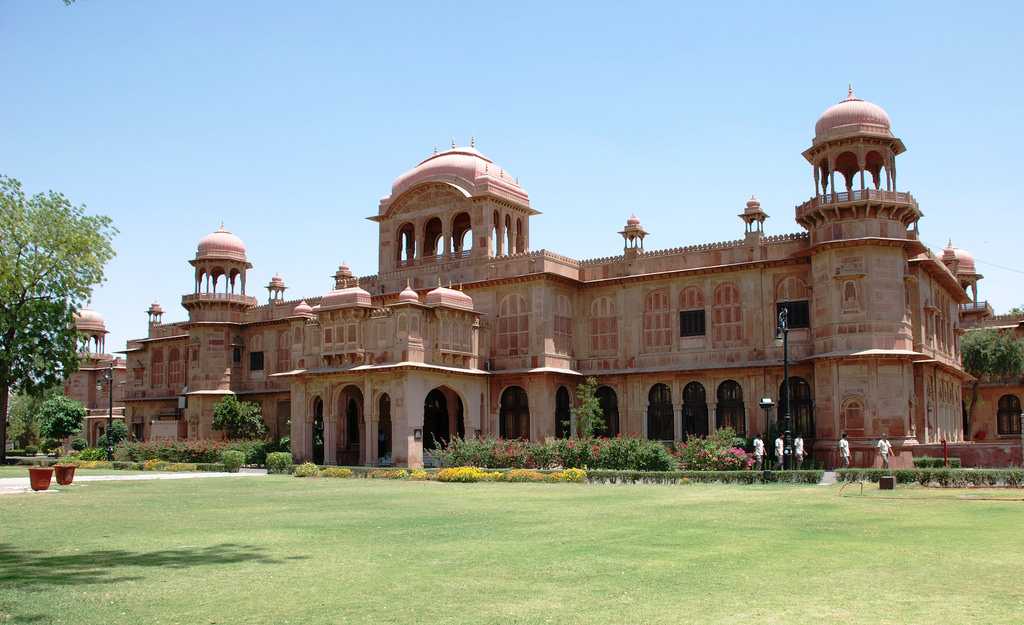

 Junagarh Fort
Junagarh Fort Karni Mata Temple
Karni Mata Temple Kote Gate
Kote Gate Rampuriya Haveli
Rampuriya Haveli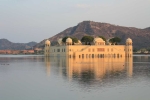 Jaipur
Jaipur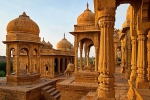 Jaisalmer
Jaisalmer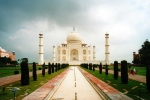 Agra
Agra Khimsar
Khimsar Osian
Osian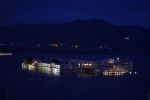 Udaipur
Udaipur